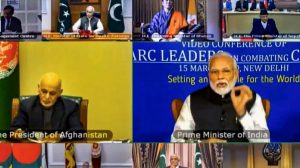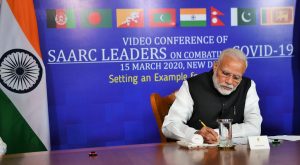
South Asian Association for Regional Cooperation (SAARC) nations came out strongly in support of India’s Prime Minister Narendra Modi’s initiatives to combat coronavirus at a video-conference, but Pakistan typically chose to indulge in grandstanding by raking up the Kashmir issue.
In a unique initiative, Prime Minister Narendra Modi held talks with the leaders of the SAARC nations through a televised video conference on March 15 and proposed the setting up of $10 million SAARC Emergency Fund to combat coronavirus. The heads of state and government of Sri Lanka, Bangladesh, Bhutan, the Maldives, Nepal, India, and the special assistant to Pakistan’s Prime Minister Imran Khan, participated in the teleconference called by PM Modi.
Sharing details of India’s preparedness to contain the virus, PM Modi told the SAARC leaders that the situation is still evolving, and “cannot predict how it will unfold”. He called for greater cooperation, including sharing of experiences and best practices by the respective countries.
Games Pakistan Play
While the leaders of all other SAARC nations shared ideas about jointly combating COVID-19, Zafar Mirza, the special assistant to Pakistan PM and a state health minister, tried to politicize the initiative by highlighting that it was a matter of concern that Covid-19 has been reported from Jammu & Kashmir. He said that the “lockdown” must be lifted immediately in view of the health emergency, and called for pooling of resources, technical expertise, and financing.
“Equity in health is a fundamental principle of public health. In this regard, let me say that it is a matter of concern that COVID-19 has been reported from Jammu and Kashmir,” he said. In view of the health emergency, it is imperative that all lockdown there must be lifted immediately, he added.
“Opening up communication and movement would facilitate dissemination of information, allow distribution of medical supplies and allow containment…to proceed unimpeded,” Mr Mirza said.
Mr Mirza also hailed China for its efforts to deal with coronavirus and urged other SAARC nations to learn best practices from it.
Pakistani minister’s intervention at the teleconference elicited adverse reactions in New Delhi and in other capitals in the region. Government sources in Delhi said that Pakistan’s use of the video conference for political point scoring reflected poorly on it.
Joint Regional Response
Barring Pakistan’s motivated spin, the rest of the region presented a picture of solidarity. “Pakistan has only exposed its true face to the region by indulging in grandstanding in the face of a global health crisis,” said Manish Chand, Editor-in-Chief, India Writes Network and India and the World magazine. “By doing so, Pakistan has reinforced its animus against India and bolstered the impression that SAARC remains largely dysfunctional due to Pakistan’s anti-India posture,” he said.
Sri Lankan President Gotabaya Rajapaksa, his Maldivian counterpart Ibrahim Mohamed Solih, and Bhutanese PM Lotay Tshering called for a joint fight against Covid-19 and its economic fallout.
The Bhutanese PM said that it is important to leave behind the differences when the world is fighting one common disease. Mr Rajapaksa said that the Sri Lanka economy, particularly tourism, has been seriously affected due to the outbreak. He asked the SAARC leaders to formulate a mechanism to assist “our economies to tide over the difficult period”.
Mr Tshering stressed that it is “important for all of us to be on same page to combat coronavirus.”
Afghanistan President Ashraf Ghani suggested a common framework for medicinal supplies between the SAARC countries and also expressed concern over the closing of borders due to the outbreak, stating that it could create shortage of food, medicines and other basic supplies. Mr Ghani also asked India to coordinate between SAARC and the SCO as well as with China to draw on its experience in combating the virus in the country.

In his opening statement, Mr Modi said: “We fully recognize we are still in an unknown situation. We cannot predict with certainty how the situation will unfold despite our best efforts. You must also be facing similar concerns. This is why it would be most valuable for all of us to share our perspective.” He said that the SAARC region has registered fewer than 150 cases so far, but it needs to remain vigilant as it is home to one-fifth of all humanity. “We can respond best by coming together, not growing apart, collaboration not confusion, preparation not panic.”
“As developing countries, all of us have significant challenges in terms of access to healthcare facilities,” Mr Modi said, adding that the SAARC nations share historical ties and “our societies are deeply inter-connected.” “Therefore, we must all prepare together, we must all act together, and we must all succeed together,” he said.
Bangladesh PM Sheikh Hasina called for a common platform to coordinate research on controlling epidemic diseases within the region. She said that the health ministers, secretaries and others should have similar teleconferences. Mr Modi offered to share the disease surveillance software that India has developed. He said a rapid response team of doctors and specialists with testing kits and other equipment would be at the disposal of its neighbours.
The Maldivian President said that no country can deal with the situation alone, and welcomed PM Modi’s suggestion of setting up a Covid-19 emergency fund. “Our collective efforts will help us devise a robust strategy for SAARC region to fight coronavirus,” said Nepal PM K.P. Sharma Oli. He underlined the importance of effective mobilization to control the spread of coronavirus.
Author Profile
- India Writes Network (www.indiawrites.org) is an emerging think tank and a media-publishing company focused on international affairs & the India Story. Centre for Global India Insights is the research arm of India Writes Network. To subscribe to India and the World, write to editor@indiawrites.org. A venture of TGII Media Private Limited, a leading media, publishing and consultancy company, IWN has carved a niche for balanced and exhaustive reporting and analysis of international affairs. Eminent personalities, politicians, diplomats, authors, strategy gurus and news-makers have contributed to India Writes Network, as also “India and the World,” a magazine focused on global affairs.
Latest entries
 DiplomacyJanuary 5, 2026India walks diplomatic tightrope over US operation in Venezuela
DiplomacyJanuary 5, 2026India walks diplomatic tightrope over US operation in Venezuela India and the WorldNovember 26, 2025G20@20: Africa’s Moment – The Once and Future World Order
India and the WorldNovember 26, 2025G20@20: Africa’s Moment – The Once and Future World Order DiplomacyOctober 4, 2025UNGA Resolution 2758 Must Not Be Distorted, One-China Principle Brooks No Challenge
DiplomacyOctober 4, 2025UNGA Resolution 2758 Must Not Be Distorted, One-China Principle Brooks No Challenge India and the WorldJuly 26, 2025MPs, diplomats laud Operation Sindoor, call for national unity to combat Pakistan-sponsored terror
India and the WorldJuly 26, 2025MPs, diplomats laud Operation Sindoor, call for national unity to combat Pakistan-sponsored terror







